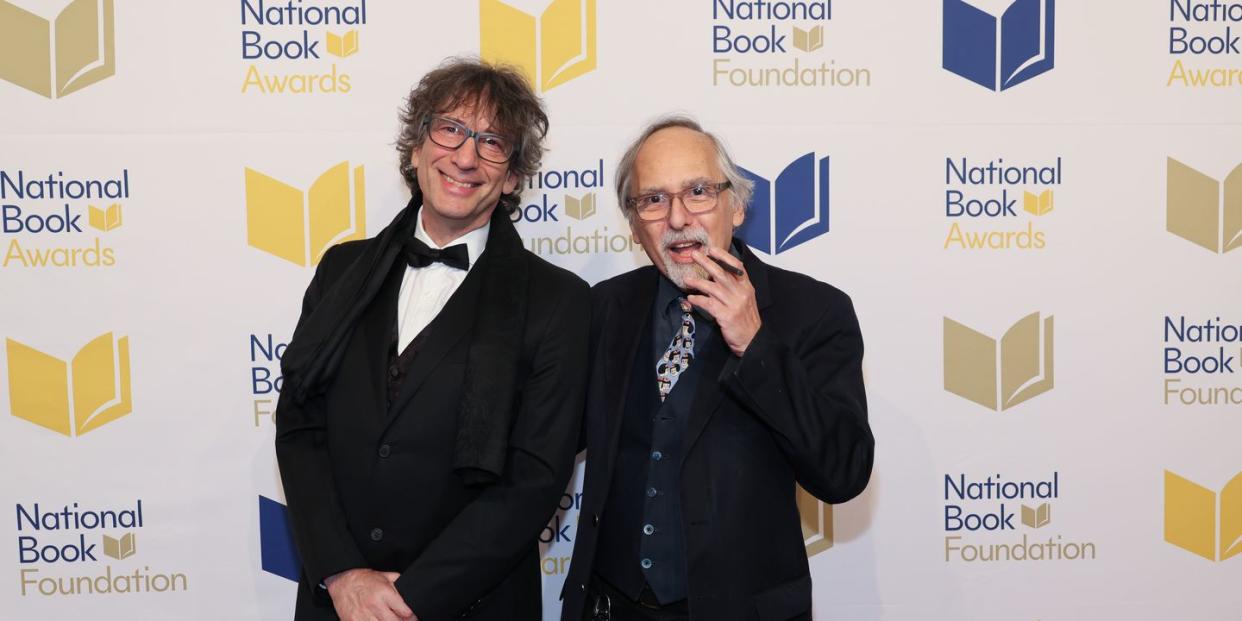The National Book Awards Raised a Middle Finger to Book Bans

As literary luminaries made their way down Wall Street to celebrate last night’s National Book Awards, they received an unexpected welcome. Members of the HarperCollins Union were stationed outside the ritzy venue, where they handed out buttons and fliers detailing their ongoing strike for higher wages, better family leave benefits, and meaningful commitments to workforce diversity. While some attendees looked befuddled, others made a proud show of solidarity—including the evening’s host, Padma Lakshmi, who walked onto the stage with the union button pinned to her meringue gown.
Last night’s ceremony marked the first in-person National Book Awards since 2019 (ever since the pandemic, the festivities have gone virtual). It was a night of celebration, but concerns hung over the festivities—about the distressing state of the publishing industry, to be certain, but also about the wave of book bans sweeping the country. In 2021, attempts to ban books in the United States surged to their highest level since the American Library Association began tracking book challenges over two decades ago. Right out of the gate, it was the topic on everyone’s lips. In her opening remarks, Lakshmi said in no uncertain terms, “This rise in book banning isn’t simply a new form of concerned parents; it’s a massive censorship campaign from organizations working with state and local officials to restrict access to books.”
Fittingly, the first award of the night went to a librarian who’s fought on the frontlines of this issue: Tracie D. Hall, the first Black woman to lead the American Library Association, who received the Literarian Award for Outstanding Service to the Literary Community. In her acceptance speech, Hall argued, “Contemporary acts of censorship have surpassed that of the McCarthy era.” She urged the audience, “Please, please stand against this effort to limit access to reading. Remember: free people read freely.”
The Medal for Distinguished Contributions to American Letters went to Art Spiegelman, the pioneering cartoonist best known for his Pulitzer Prize-winning graphic novel Maus, an often-banned book about the Holocaust. Spiegelman acknowledged his surprise at the National Book Foundation “letting cartoonists into the great hall of literature,” joking, “I was so terrified of putting together a speech for this august crowd. I even contemplated sending a suicide note instead. But hey, I had writer’s block.” Spiegelman’s remarks were often funny and self-deprecating, but he, like so many others, took aim at right-wing attempts to ban books. “Everyone just wanted a kinder, gentler Holocaust to teach” the author mused, before jokingly thanking “my shrewd marketers on that local school board” for sending Maus to the top of the bestseller list once again.
The National Book Award for Young People’s Literature went to Sabaa Tahir for All My Rage, a young adult novel about a Pakistani family struggling to keep their Mojave Desert hotel afloat. Noting that she is the first Muslim and the first Pakistani-American woman to win this award, a tearful Tahir called out to her “Muslim sisters” fighting for their freedoms in the Middle-East. She dedicated the trophy to her readers, saying, “I have been a misfit and an outcast and lonely and lost, but when I write for you, I am none of those things.”
The National Book Award for Translated Literature, presented by renowned translator Ann Goldstein, went to Samanta Schweblin, author of the surreal short story collection Seven Empty Houses, along with her translator, Megan McDowell. Schweblin gave a warm thanks to her loved ones, saying that as a short story writer, she would keep it brief. McDowell spoke about the importance of translated literature, saying, “Any act of communication is an act of translation,” before embracing Schweblin.
The National Book Award for Poetry went to John Keene for Punks: New and Selected Poems, a collection that spans decades of Keene’s long literary career. Keene dedicated the award to his ancestors “by lineage and association, including several generations of writers, particularly the Black, gay, queer, and trans writers, especially those whom we lost to HIV/AIDS in the 1980s and 1990s.” The poet said of these writers, “They were brilliant, they were fierce, they were daring, they were creative.” Keene also urged audience members to support libraries, librarians, and publishing industry workers.
The National Book Award for Nonfiction went to Imani Perry for South to America, one of Esquire’s Best Books of 2022, a genre-bending love letter to the land of “big dreams and bigger lies” below the Mason-Dixon line. Taking the stage amid roaring cheers and whistles, Perry said, “I write for my people. I write because we children of the lash-scarred, rope-choked, bullet-ridden, desecrated are still here, standing.” She continued, “I write for the ones who clean the toilets and till the soil and walk the picket lines. For the hungry, the caged, the disregarded, the holding on—I write for you. I write because I love sentences, and I love freedom more.”
The final award of the night, the National Book Award for Fiction, went to Tess Gunty for The Rabbit Hutch, her debut novel about neighbors living in low-income housing in Indiana. “I truly believe that attention is the most sacred resource that we have to spend on this planet,” Gunty said. “Books are perhaps one of the last places where we spend this resource freely and where it means the most.”
You Might Also Like

